Texas High School Student Suspended For Refusing To Stand During Pledge Of Allegiance
A pretty clear violation of the First Amendment.
A high school student in a district outside of Houston, Texas was suspended because he refused to stand during the Pledge of Allegiance:
NEEDVILLE, Texas — Mason Michalec says he loves his country but just not the government.
“I’m really tired of our government taking advantage of us,” said Michalec. “I don’t agree with the NSA spying on us. And I don’t agree with any of those Internet laws.”
That’s why he’s taken a pledge of sorts to not say the Pledge of Allegiance with classmates.
“I’ve basically said it from the time I was in kindergarten to earlier this year and that’s when I decided I was done saying it.”
For the most this year, his silent protest has gone unnoticed. But on Wednesday, when a different teacher observed it for the very first time, the Needville High School sophomore ran into trouble.
“And she told me this is my classroom,” said Michalec. “This is the principal’s request. You’re going to stand. And I still didn’t stand and she said she was going to write me up.”
Michalec says the principal sentenced him to two days of in school suspension, and warned that he could face more ISS if his protest continued.
It’s a consequence the 15-year-old seems prepared to face.
“And I think it’s time that people do something for themselves and stop taking whatever’s handed to them,” said Michalec. “I’m angry and frustrated and annoyed that they would try to write me up for something I have the right to do.”
The school district is not responding to requests for comments about the matter, which may be a consequences of both education privacy laws and the legal position that the principal’s position has placed the district. It’s also worth noting that, often, reports like this end up getting supplemented with additional facts that give more perspective to the story. For example, perhaps there was more to the incident involved than Michalec simply refusing to stand for the Pledge, in which case the discipline imposed should obviously be looked at in a different light. At the moment, though, there’s no evidence that this is the case and this it appears that he was suspended solely, or at least principally, because he refused to stand for the pledge. If that’s the case, then this is pretty much a legal no-brainer and the school district is obviously in the wrong.
The legal issues here couldn’t possibly be more clear, as a matter of fact, and stretch back 71 years to a Supreme Court decision that has served as the basis for most modern First Amendment law. In that case, West Virginia Board of Education v. Barnette, the Supreme Court dealt with sisters who were expelled from school for refusing to comply with a state law that required all students to recite the Pledge of Allegiance each day. In a 6-3 opinion, the Court ruled that the law was unconstitutional and that no student could be forced to recite the Pledge:
There is no doubt that, in connection with the pledges, the flag salute is a form of utterance. Symbolism is a primitive but effective way of communicating ideas. The use of an emblem or flag to symbolize some system, idea, institution, or personality, is a short cut from mind to mind. Causes and nations, political parties, lodges and ecclesiastical groups seek to knit the loyalty of their followings to a flag or banner, a color or design. The State announces rank, function, and authority through crowns and maces, uniforms and black robes; the church speaks through the Cross, the Crucifix, the altar and shrine, and clerical reiment. Symbols of State often convey political ideas just as religious symbols come to convey theological ones. Associated with many of these symbols are appropriate gestures of acceptance or respect: a salute, a bowed or bared head, a bended knee. A person gets from a symbol the meaning he puts into it, and what is one man’s comfort and inspiration is another’s jest and scorn.
Over a decade ago Chief Justice Hughes led this Court in holding that the display of a red flag as a symbol of opposition by peaceful and legal means to organized government was protected by the free speech guaranties of the Constitution. Stromberg v. California, 283 U.S. 359 , 51 S.Ct. 532, 73 A.L.R. 1484. Here it is the State that employs a flag as a symbol of adherence to government as presently organized. It requires the individual to communicate by word and sign his acceptance of the political ideas it thus bespeaks. Objection to this form of communication when coerced is an old one, well known to the framers of the Bill of Rights. 13
It is also to be noted that the compulsory flag salute and pledge requires affirmation of a belief and an attitude of mind. It is not clear whether the regulation contemplates that pupils forego any contrary convictions of their own and become unwilling converts to the prescribed ceremony or whether it will be acceptable if they simulate assent by words without belief and by a gesture barren of meaning. It is now a commonplace that censorship or suppression of expression of opinion is tolerated by our Constitution only when the expression presents a clear and present danger of action of a kind the State is empowered to prevent and punish. It would seem that involuntary affirmation could be commanded only on even more immediate and urgent grounds than silence. But here the power of compulsion is invoked without any allegation that remaining passive during a flag salute ritual creates a clear and present danger that would justify an effort even to muffle expression. To sustain the compulsory flag salute we are required to say that a Bill of Rights which guards the individual’s right to speak his own mind, left it open to public authorities to compel him to utter what is not in his mind.
Whether the First Amendment to the Constitution will permit officials to order observance of ritual of this nature does not depend upon whether as a voluntary exercise we would think it to be good, bad or merely innocuous. Any credo of nationalism is likely to include what some disapprove or to omit what others think essential, and to give off different overtones as it takes on different accents or interpretations. 14 If official power exists to coerce acceptance of any patriotic creed, what it shall contain cannot be decided by courts, but must be largely discretionary with the ordaining authority, whose power to prescribe would no doubt include power to amend. Hence validity of the asserted power to force an American citizen publicly to profess any statement of belief or to engage in any ceremony of assent to one presents questions of power that must be considered independently of any idea we may have as to the utility of the ceremony in question.
(…)
he very purpose of a Bill of Rights was to withdraw certain subjects from the vicissitudes of political controversy, to place them beyond the reach of majorities and officials and to establish them as legal principles to be applied by the courts. One’s right to life, liberty, and property, to free speech, a free press, freedom of worship and assembly, and other fundamental rights may not be submitted to vote; they depend on the outcome of no elections. [319 U.S. 624, 639] In weighing arguments of the parties it is important to distinguish between the due process clause of the Fourteenth Amendment as an instrument for transmitting the principles of the First Amendment and those cases in which it is applied for its own sake. The test of legislation which collides with the Fourteenth Amendment, because it also collides with the principles of the First, is much more definite than the test when only the Fourteenth is involved. Much of the vagueness of the due process clause disappears when the specific prohibitions of the First become its standard. The right of a State to regulate, for example, a public utility may well include, so far as the due process test is concerned, power to impose all of the restrictions which a legislature may have a ‘rational basis’ for adopting. But freedoms of speech and of press, of assembly, and of worship may not be infringed on such slender grounds. They are susceptible of restriction only to prevent grave and immediate danger to interests which the state may lawfully protect. It is important to note that while it is the Fourteenth Amendment which bears directly upon the State it is the more specific limiting principles of the First Amendment that finally govern this case.
Twenty-six years later, in Tinker v. Des Moines Independent Community School District 393 U.S. 501 (1969), the Court deal with the case involving students who were had been disciplined for taking part in an anti-war protest during the Vietnam War. In its decision, the Court held that the student’s right to express their political beliefs as protected by the First Amendment outweighed any argument the school could make that its actions were necessary to keep discipline and order in the school:
The school officials banned and sought to punish petitioners for a silent, passive expression of opinion, unaccompanied by any disorder or disturbance on the part of petitioners. There is here no evidence whatever of petitioners’ interference, actual or nascent, with the schools’ work or of collision with the rights of other students to be secure and to be let alone. Accordingly, this case does not concern speech or action that intrudes upon the work of the schools or the rights of other students.
Only a few of the 18,000 students in the school system wore the black armbands. Only five students were suspended for wearing them. There is no indication that the work of the schools or any class was disrupted. Outside the classrooms, a few students made hostile remarks to the children wearing armbands, but there were no threats or acts of violence on school premises.
(…)
First Amendment rights, applied in light of the special characteristics of the school environment, are available to teachers and students. It can hardly be argued that either students or teachers shed their constitutional rights to freedom of speech or expression at the schoolhouse gate. This has been the unmistakable holding of this Court for almost 50 years. In Meyer v. Nebraska, 262 U.S. 390 (1923), and Bartels v. Iowa, 262 U.S. 404 (1923), this Court, in opinions by Mr. Justice McReynolds, held that the Due Process Clause of the Fourteenth Amendment prevents States from forbidding the teaching of a foreign language to young students. Statutes to this effect, the Court held, unconstitutionally interfere with the liberty of teacher, student, and parent. 2 See also Pierce v. Society of Sisters, [393 U.S. 503, 507] 268 U.S. 510 (1925); West Virginia v. Barnette, 319 U.S. 624 (1943); McCollum v. Board of Education, 333 U.S. 203 (1948); Wieman v. Updegraff, 344 U.S. 183, 195 (1952) (concurring opinion); Sweezy v. New Hampshire, 354 U.S. 234 (1957); Shelton v. Tucker, 364 U.S. 479, 487 (1960); Engel v. Vitale, 370 U.S. 421 (1962); Keyishian v. Board of Regents, 385 U.S. 589, 603 (1967); Epperson v. Arkansas, ante, p. 97 (1968).
(…)
In our system, state-operated schools may not be enclaves of totalitarianism. School officials do not possess absolute authority over their students. Students in school as well as out of school are “persons” under our Constitution. They are possessed of fundamental rights which the State must respect, just as they themselves must respect their obligations to the State. In our system, students may not be regarded as closed-circuit recipients of only that which the State chooses to communicate. They may not be confined to the expression of those sentiments that are officially approved. In the absence of a specific showing of constitutionally valid reasons to regulate their speech, students are entitled to freedom of expression of their views. As Judge Gewin, speaking for the Fifth Circuit, said, school officials cannot suppress “expressions of feelings with which they do not wish to contend.” Burnside v. Byars, supra, at 749.
It is true that, in the years since Barnette and Tinker there have been decisions from the Court that have seemingly eroded student’s first Amendment rights. In both Bethel School District v. Fraser and Hazelwood v. Kuhlmeier, the Court seemed to limit student free speech rights in favor of the ability of school administrators to maintain discipline in the school. However, those two cases are arguably unique given their facts. In Fraser case a student had been disciplined after giving a speech to a public assembly that was filled with sexual innuendo. The Hazelwood case, meanwhile, involved the question of how much editorial control a school could have over a student newspapers, and the court was essentially faced with the question of whether or not the Constitution forbade a school from maintain control over the curriculum of a school activity. More recently, in Morse v. Frederick, the Court had upheld a school’s decision to discipline a student who had unfurled a banner that said “Bong Hits 4 Jesus” despite the fact that there was no evidence that there had been any disruption in school and the fact that the event had actually occurred at an off-campus event. All three events have in common the fact that students were allegedly doing something that disrupted school function and which, unlike Tinker, did not have a political component. In school as in the rest of society, there are limits to freedom of speech when ones speech is little more than rabble rousing and disruption.
Assuming again that the facts as they have been related so far are accurate, it seems clear to me that this Texas case falls in the category of cases like Barnette and Tinker rather than the more recent cases that have seemingly limited student’s rights in some circumstances. Michalec was not disrupting the class, he was not trying to stop the teacher from having control over the classroom. He was simply sitting in his seat refusing to stand during the Pledge. Since it’s already established that students cannot be forced to say the pledge, it seems axiomatic that it is impermissible to punish them because they refuse to stand while it is recited. I’m not sure if this matter will ever make it to Court, but if it did the outcome seems foreordained.
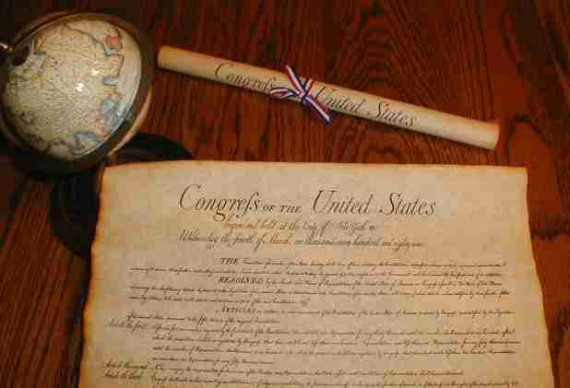

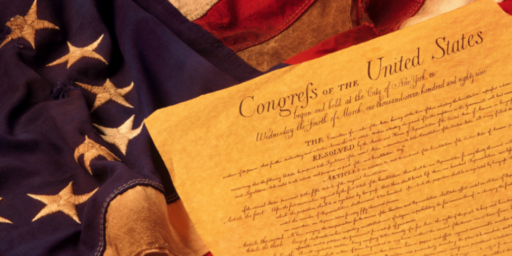
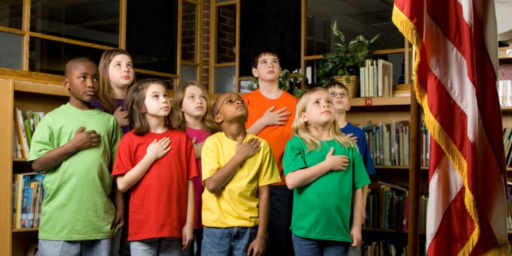
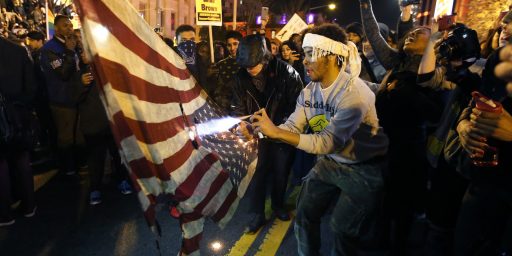
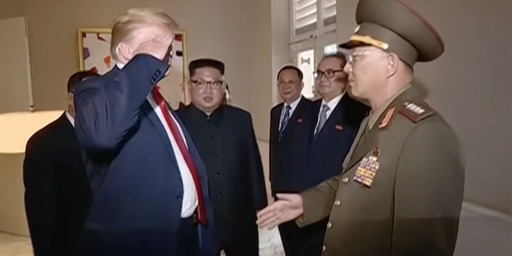
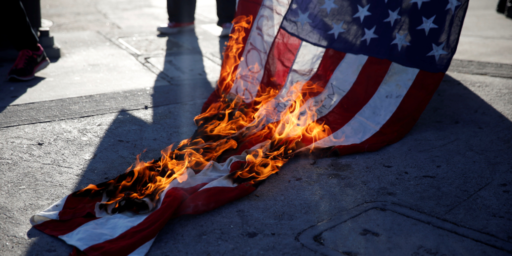
If the facts are as presented, slam dunk win for the student.
Excellent post, Doug. For the legal analysis, of course, but especially for the caution with news reports. I would be a little surprised that there’s a principal who doesn’t know the clear precedents here.
Utter B.S. Pledges are for the weak-minded to attempt to control the thoughts of others. Hope the school district has deep pockets.
Of course this is in Texas. Because FREEDOM!!!!
I’ve never understood this desire to force students to say the Pledge every day. Does it only work for a day or two, and then has to be repeated? Personally, I’d think that if I pledged my allegiance to something once, it should be good for life. If you have to repeat it over and over and over again thousands of times, then it doesn’t seem like it really works, does it…?
That is NOT why who was suspended. He was suspended for not doing what he was told. Rare is the teacher or administrator that can tolerate defiance.
Brave kid, willing to stand up and take the inevitable for doing so.
@OzarkHillbilly:
Indeed, defiance of authority is most probably the issue seen by the principal.
I certainly think that the school erred in this situation. Equally troubling, disgraceful, unbelievable, and ridiculous is the school in California that told students that they could not wear a shirt with the US flag on it; and the school administration was upheld by some misguided judge. All the while the school was allowing some sort of ridiculous Mexican celebration. Supposedly the judge was worried that the sight of a US flag might just offend somebody or create an uproar! In the US ! Really? The school should have told those students to go to Mexico to do their celebrating – this is the USA mister! It’s so crazy. I guess next a school will ban the flag and displays of the Declaration of Independence. Most, if not all, schools in our state have the pledge evety morning. I remember that we had the pledge every morning when I was in school (and many a college class) and I don’t recall anyone having problems with it. Let me say again that no one should be forced to say the pledge. Some day they will be thankful that they live in a country where they have that kind of freedom.
“I’m proud to be an American …God bless the USA!”(Greenwood)
@Tyrell:
I agree that too is troubling. I suspect it is as Ozark said – the problem is not doing what you’re told.
“If there is any fixed star in our constitutional constellation, it is that no official, high or petty, can prescribe what shall be orthodox in politics, nationalism, religion, or other matters of opinion or force citizens to confess by word or act their faith therein. If there are any circumstances which permit an exception, they do not now occur to us.”
Justice Jackson, West Virginia v. Barnette
I posted this quote on FB the other day regarding the prayer before city council meeting decision. While that wasn’t a free speech case, Jackson pretty much covered the issues I have with that decision. Covered it beautifully, I might add.
@Tyrell:
Yeah, just like the Irish-Americans should go to Dublin if they want to have a St. Patrick’s Day Parade! Ridiculous! Why, the sight of Midtown Manhattan festooned with Irish flags on St. Patrick’s just makes my blood boil! USA, love it or leave it!
@Tyrell:
Naturally, conservative talk radio + Fox News turned that story into another “aggrieved white people” story. Those school administrators told those kids to turn their shirts prominently displaying the American Flag inside out, or go home, because these white students wanted to wear the flag on Cinco de Mayo Day, in order to incite the latino students. School administrators wanted to avoid that problem.
I’m guessing that those students probably had no interest in wearing American Flag apparel except for this one day, that’s how much they love the flag. But hey … we’re number one!
@walt moffett:
Which begs the obvious question:
No one argues that a school administration cannot already drastically limit the free speech of students — telling them when they may and may not speak and what language they may use, disciplining them for being disrespectful or sullen or profane, punishing noncompliant behavior in various ways. So how is the Pledge of Allegiance somehow different?
The only cases I’d heard in the past involved members of a religious sect whose creed prohibited secular oaths of fealty. It can’t just be a “freedom of speech” issue, because no minor student anywhere has freedom of speech.
@Tyrell: “Let me say again that no one should be forced to say the pledge. Some day they will be thankful that they live in a country where they have that kind of freedom.”
They will be thankful to have the freedom to be forced to say the pledge? Seriously?
@al-Ameda:
Probably true, but irrelevant. Just as Latino students should have the right to celebrate Cinco de Mayo day as they wanted, but others should have the right to wear national symbols as they wanted as well. Not only because both actions should (and I suspect if it went to the SCOTUS would) be protected, but because it would be a teaching opportunity all around.
The whole point of freedom of speech is that it has to protect people’s right to be annoying or wrong. Its not mutually exclusive to be proud to be Latino and simultaneously American, and there should be no conflict between people wearing US and Mexican symbols in California on Cinco de Mayo or July 4th – and if some students thought there was (in either case), the school should be using the opportunity to educate them otherwise.
In Canada ‘red’ is a aboriginal (ie Indian) gang colour (note the English/Canadian spelling of color for extra points), and a few local schools were discussing banning obvious displays of it – until of course people pointed out it was also one of the colours of the Canadian flag (and Team Canada hockey sweaters etc). They decided instead to raise awareness of the whole issue on all sides with the students instead of banning such symbols. And it worked pretty well.
I was really hoping to get some discussion on why minor students at school have First Amendment free speech rights with regard to the Pledge of Allegiance, but not with regard to ordinary speech at ordinary times. Maybe one of the downvoters could offer an analysis…?